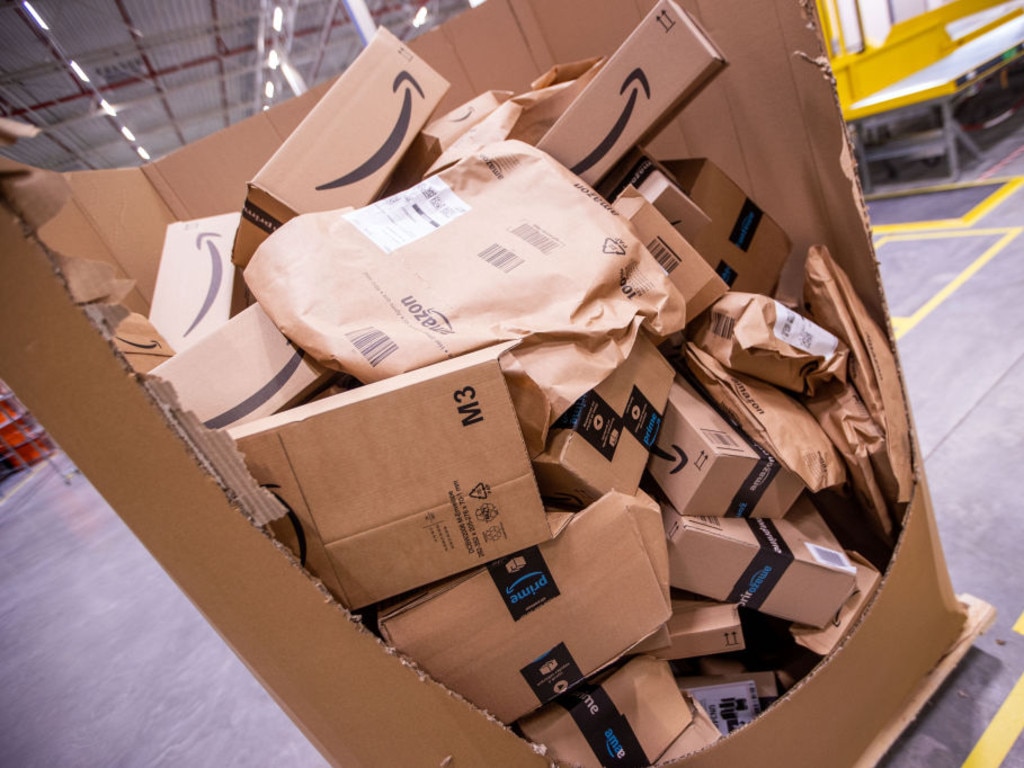Pandemic package delivery surge is contributing to an alarming environmental crisis: report
A startling new report about a simple reality of lockdown living has begun to generate waves amongst activist groups - but a major retailer has fired back.
A startling new report from marine conservation group Oceana has pinned delivery giants such as Amazon for a startling rise in plastics found in the ocean.
In a December release, the environmental organisation analysed e-commerce packaging data and found the US shipping monolith Amazon reportedly generated 271 million kilograms of plastic packaging waste in 2020, marking a substantial 29 per cent increase of its 2019 estimate of 210 million kg.
The report also found Amazon’s estimated plastic packaging waste, in the form of air pillows alone, could circle planet Earth over 600 times.
The report combined packaging data with recent findings published in Science, estimating up to 10 million kilograms plastic packaging from Amazon alone had entered the world’s waterways in 2020.
Oceana argues the amount is equivalent of dumping an Amazon delivery van full to the brim of plastic into the oceans every hour.
Amazon plastic uses “plastic film” material, which is more difficult to recycle and is not accepted by most residential recycling systems, researchers said.
The release also claims to expose the online giant’s “empty recycling promises” following its most successful year on record, which saw the US-based company’s sales rise 38 per cent, to $386 billion (A$542.09 bn).
Amazon has denied the claims, arguing Oceana’s calculations are “seriously flawed”, and made using “outdated assumptions”.


As a company revolutionising the way customers order and receive products, Amazon experienced a massive uptick in demand as the world entered lockdown.
Same-day delivery in metro areas meant customers in the world’s biggest cities were sometimes able to order a pair of shoes while eating breakfast and be wearing them to the supermarket that afternoon.
Oceana’s report concluded that the recycling efforts of the world’s biggest retailer “will not significantly reduce its enormous plastic footprint”.
“We are using the best data available to us. If Amazon was transparent, we would gladly use their data. Yes, they are using more non-plastic packaging, but they are also selling a ton more product,” senior vice-president Matt Littlejohn said, via the Guardian.
“We understand people need Amazon. And so we’re hoping Amazon can fix this problem and become a leader in reducing plastic, which is really important for the oceans.”
“Plastic is a major source of pollution and is devastating the world’s oceans. Sea turtles and other ocean animals mistake the kind of plastic used by Amazon as food which can ultimately prove fatal.”
As part of the study, Oceana surveyed 1,400 Amazon Prime customers in the United States and the UK, revealing 94.8 per cent are “concerned about plastic pollution’s impact on the oceans”, while 91 per cent believed Amazon should reduce its use of plastic packaging and offer plastic-free packing choices at checkout.
However, Amazon believes Oceana’s calculations are “seriously flawed”, claiming the environmentalist organisation “overestimated our plastics usage by more than 300 per cent, and use outdated assumptions about the sources of plastic waste entering our oceans”.
“Amazon is making rapid progress in reducing or removing single-use plastics from packaging materials around the world,” a spokesperson told news.com.au.
“As a co-founder of The Climate Pledge, Amazon is committed to protecting the planet and achieving net-zero carbon by 2040. We continue to welcome informed, constructive dialogue with NGOs and others on these issues.”

In addition, a study published in Nature Sustainability in June 2021 revealed the majority of ocean waste still came from takeaway food and beverage litter.
“Here, we harmonise worldwide litter-type inventories across seven major aquatic environments and find that a set of plastic items from take-out food and beverages largely dominates global litter, followed by those resulting from fishing activities,” the study stated.
The rising levels of plastic in the world’s oceans has long been cause for concern for environmentalists.
Conservation researchers in Australia have revealed startling amounts of waste building up in some of the more pristine pieces of the country’s coastline.
2019 documentary Protecting Paradise revealed just how much plastic pollution is accumulating. Marine biologist Laura Wells travelled to Far North Queensland and some of the outer reefs and remote islands in the Great Barrier Reef and revealed some daunting figures on plastic buildup.
Ms Wells and members of her team collected 800kg of plastic rubbish over a few days of filming. According to the production team, they could have collected much more but were limited in time and the space they had to carry the rubbish.
From their observations and after looking at things like drone footage, they estimated there was about 1000kg of plastic for every kilometre of beach.
“There was definitely a mixture, some was from overseas and some from Australia — judging from the labels,” Ms Wells said.
“The Great Barrier Reef and its ecosystems are seen as pristine but it is quite heavily damaged by plastic pollution.”




